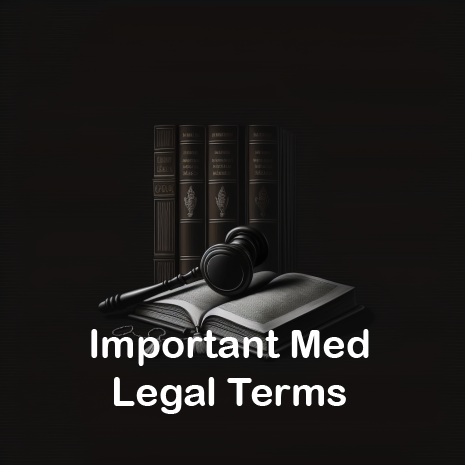5 Important Med Legal Terms
Introduction:
This short guide goes over 5 key terms that relate to a deposition. A deposition is typically not held before a judge and is generally considered an informal legal proceeding. A deposition is a sworn statement by a witness under oath in a legal case. The witness is typically questioned by an attorney or other party to the legal proceeding, and a court reporter transcribes the questioning. Depending on the circumstances, the deposition may be conducted in person, over the phone, or through other means of communication.
5 Key Terms
- Witness: In a legal context, a deposition is a sworn statement given by a witness under oath. The witness may be questioned by an attorney or other party to the legal proceeding.
- Court reporter: A court reporter is a professional who is trained to transcribe the words spoken during a deposition or other legal proceeding. The court reporter may use a stenograph machine or other technology to record the proceedings.
- Transcript: The transcript is a written record of the words spoken during a deposition or other legal proceeding. A court reporter typically prepares the transcript.
- Cross-examination: During a deposition, the witness may be questioned by an attorney or other party to the legal proceeding. The questioning party is typically allowed to ask follow-up questions, known as cross-examination, to clarify or challenge the witness’s testimony.
- Objection: During a deposition or other legal proceeding, an attorney or other party may object to a question or answer because it is irrelevant, leading, or otherwise improper. The objection must be made on the record and may be ruled on by the judge or other decision-maker in the case.
Purpose of a Deposition
A deposition typically gathers information and evidence in a legal case. The deposition may clarify or supplement the witness’s testimony or challenge the witness’s credibility. Depositions may be taken before or during a trial but are not held in front of a judge.
It is important to note that while depositions are generally considered informal, they are still legal proceedings, and the witness is under oath. If a witness makes false statements during a deposition, they may be subject to legal consequences, such as perjury charges.
Ultimately a deposition is a crucial part of the legal process, where a witness gives a sworn statement under oath. During a deposition, a court reporter transcribes the words spoken by the witness and any attorneys or other parties present. The transcript is a written record of the deposition that can be used as evidence in court. Attorneys may also cross-examine the witness to clarify or challenge their testimony. At any point during the deposition, an attorney or other party may object to a question or answer because it is irrelevant, leading, or otherwise improper. In this blog post, we’ll explore the role of depositions in the legal process and the importance of accurate transcriptions and objections.
Summary
When it comes to legal terms and materials, it is more important to be aware of the concept as a healthcare provider than to become an expert in this. Be aware of the concepts, and know your resources and do not be afraid to use them. Should you find yourself in a situation where these terms are important to you, do not be afraid to reach out to your employer, or even an attorney at your local level. The information contained in this site is provided for informational purposes only, and should not be interpreted as legal advice on any subject matter. While there is not a shortage of resources or guides to these things all over the internet, the list above is very concise and to the point over the main idea for this system. If you’re interested in additional resources, we have a brief study guide for all the main systems available for free, with even more available if you subscribe and create a paid account today.
